The economy remains one of the most critical issues for American voters, especially in battleground states that could determine the outcome of the upcoming presidential election. As the nation grapples with inflation, employment challenges, and economic recovery post-pandemic, voters in these decisive regions are vocal about which presidential candidate they believe will best handle these pressing economic issues.
In recent polls conducted across several battleground states, including Pennsylvania, Wisconsin, and Arizona, voters expressed diverse opinions about the economic policies and capabilities of the leading presidential candidates. The economy ranks high among the concerns of the electorate, often outweighing other critical issues. Many voters see their economic concerns as directly affecting their daily lives and future stability, making it a top priority in their decision-making process.
Historically, these battleground states have swung between parties, making them pivotal in the electoral process. Economic performance and policies are often the tipping points for many voters when choosing a candidate. This year is no different, as economic strategies related to inflation control, job creation, and tax policies dominate political discussions in these areas.
Voters favoring the incumbent administration argue that current economic policies are effective and require continuity for long-term benefits. They cite decreasing unemployment rates and measures taken to combat inflation as steps in the right direction. For these voters, stability and consistency in leadership are crucial for economic recovery and growth, aligning with their preference for the current administration’s candidate.
Conversely, a segment of the electorate remains dissatisfied with the current economic conditions and is eager for change. These voters often emphasize the need for new strategies to stimulate the economy and tackle the rising cost of living. They seek a candidate who promises innovation and reform, reflecting their desire for significant shifts in economic management.
The economic narrative has energized both candidates’ campaigns, with each side emphasizing their strengths and critiquing their opponents’ weaknesses. Debates and campaign rallies have increasingly focused on economic agendas, with candidates tailoring their messages to address specific concerns in these crucial states.
Ultimately, the decision of battleground state voters will hinge on which candidate can convincingly reassure them of a stable and prosperous economic future. As the election draws nearer, both parties are intensifying their efforts to win over undecided voters by promising to deliver on economic improvements and security. In these same battleground areas, the success of their economic messaging is likely to play a decisive role in shaping the overall electoral outcome.
































